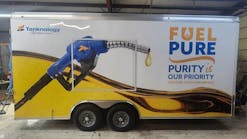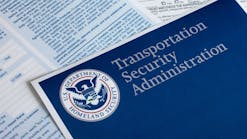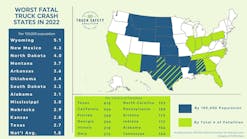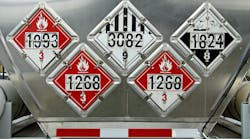The Pipeline and Hazardous Materials Safety Administration (PHMSA) is considering revisions to the Hazardous Materials Regulations (HMRs) that improve hazmat transportation efficiency, transparency, and stakeholder engagement—and better accommodate technological innovations—while maintaining or improving public safety.
The U.S. Department of Transportation agency’s Advance Notice of Proposed Rulemaking (ANPRM) published this summer includes 46 topics—nearly half of which National Tank Truck Carriers leaders say apply to the tank truck industry, including rules for maintaining emergency response information (ERI) and training requirements for cargo tank registered inspectors. So NTTC, along with 20 other organizations, submitted comments Dec. 4 on the last day of the extended deadline for stakeholder feedback on PHMSA’s HMR initiatives.
The full 22-page letter to William Schoonover, PHMSA associate administrator for hazmat safety, is available here.
“The length of the letter is indicative of PHMSA’s many questions that are pertinent to the tank truck industry,” Will Lusk, NTTC director of education and government relations, who composed the letter, told Bulk Transporter. “PHMSA requested feedback on 46 topics for potential change within the hazardous materials regulations. I identified over 20 as being applicable to the tank truck industry, and of those 20-ish topics that applied, I was able to get member feedback on 15. And there are sub-questions within each of those topics.
“So PHMSA asked for a lot, and I think they’re using this mechanism as a way to address many unanswered questions from the past 10 years.”
Other 11th-hour filers include the American Chemistry Council, newly rebranded Depot Connect International, and The Dow Chemical Company. American Trucking Associations, the Commercial Vehicle Safety Alliance, the National Transportation Safety Board, and the Truck Trailer Manufacturers Association previously registered comments.
Lusk now expects federal regulators to “digest” the comments over the next several months before deciding which topics to act on and taking the next step of issuing a Notice of Proposed Rulemaking (NPRM). “Once they release the NPRM, we’ll have a better idea of what the federal government wants to do based on this initial feedback collection exercise,” Lusk said. “In other words, don’t expect anything anytime soon.”
Carrier ERI maintenance evaluation
In accordance with the requirements in HMR Section 172.602, hazmat carriers must maintain ERI onboard their motor vehicles that is “immediately accessible” to drivers and emergency responders in an incident involving hazardous materials. Yet drivers rarely use the documents, and first responders typically bring their own, Lusk said.
“The problem is drivers receive violations because it’s not within reach or it’s an outdated copy, or something like that, which results in a ticket that comes with a cost, and more importantly, an increase in CSA [Compliance, Safety, Accountability] points, which means higher insurance rates,” Lusk explained. To avoid exposing companies to this unnecessary risk, NTTC members want to replace paper copies with electronic records. “It could be as simple as a QR code on the side of a tank that anybody could scan to get the ERI,” he said.
“Let’s still make that information available—but in a way that doesn’t leave carriers and drivers susceptible to violations.”
Registered inspector training, qualification
To meet the requirements outlined in Part 180, Subpart E, DOT- and MC-specified cargo tanks must be tested and inspected by a person who is registered with the Federal Motor Carrier Safety Administration; is familiar with DOT cargo tanks, and trained and experienced in the use of inspection and testing equipment; and has the training and experience required to meet the definition of a registered inspector in HMR Section 171.8.
“I can tell you, anecdotally from my chair, there are a lot of questions and uncertainties about the definition of a registered inspector,” said Lusk, who manages NTTC’s inspector workshops. “So, NTTC is urging PHMSA to clarify the definition of a registered inspector, particularly regarding the minimum experience required.”
As currently written, a person with one to three years of experience, depending on their level of education, can become a registered inspector—even if they inspected only two tanks in three years. “Is that really the intent of the government?” Lusk asked. Additionally, candidates born after 1991 must have at least a high school diploma, so NTTC supports PHMSA’s proposal for an alternative path to certification.
“There are very qualified people who could be registered inspectors but didn’t graduate from high school or can’t prove they did,” Lusk said. “Well, you don’t need a high school diploma to become a truck driver in many jurisdictions. So let’s widen the pool of people who can be registered because they’re desperately needed.”










